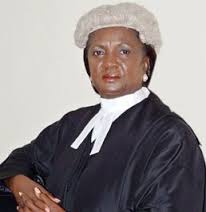- Home - News
- TWI News | TV
- Polls
- Year In Review
- News Archive
- Crime & Punishment
- Politics
- Regional
- Editorial
- Health
- Ghanaians Abroad
- Tabloid
- Africa
- Religion
- Election 2020
- Coronavirus
- News Videos | TV
- Photo Archives
- News Headlines
- Press Release
General News of Monday, 11 May 2015
Source: Daily Guide
Judge fights back over bias claim

A justice of the Court of Appeal, Justice Saeed Kwaku Gyan, has rubbished claim by some workers’ unions that he showed bias in a case between the government and the unions over the management of their second tier pension funds.
Eleven workers’ unions battling the government over the management of the funds petitioned Chief Justice Georgina Wood on April 10, 2015 to transfer the case entitled: ‘The Attorney-General versus Health Workers Union and 11 others,’ from Justice Kwaku Gyan’s court because they claimed he was being biased.
According to the Health Sector Occupational Pension Scheme, Ghana Educational Service (GES), Occupational Pension Scheme and the Hedge Master Trust Occupational Pensions Scheme – which are representatives of the defendants in the case – the judge’s conduct in the case had made them “apprehensive.”
They had claimed among other things, that the presiding judge was demonstrating “an inclination or preference for the case of the plaintiff (the Attorney General) and added that he was according “more attention to the counsel for the plaintiff.”
However, Justice Gyan reacted with a rejoinder on April 28, denying categorically the claim of bias and said, “I have no personal or special interest in the 2nd Tier Pension case involving the Workers’ Unions and the Republic of Ghana.”
He maintained, “It was the Chief Justice of Ghana who specifically assigned the case to me, as she is entitled by law so to do, to handle it as an additional High Court judge. It is my duty to deal with the matter to the best of my ability and in accordance with the dictates of my conscience and my judicial oath.”
The judge said that the first application for interlocutory injunction in connection with the workers’ strike action was heard in November, 2014 and a ruling given on December 16, 2014 adding, “The workers’ unions, who are now complaining about the said ruling, had by law 21 days only to appeal if they felt aggrieved.
“Why did they not appeal against my decision but are now raid-sing issues about that application six months after the event,” he queried.
He further said the application concerning the striking out of the Bank of Ghana (BoG) as a party to the suit was filed on December 3, 2014, argued in January 2015 and a ruling delivered on February 16, 2015 and as usual, the workers were entitled to appeal but failed to do so only to turn around to accuse him of bias.
“Being an interlocutory decision, the court has no jurisdiction to extend time to appeal after the 21 days deadline. The workers’ unions who are now complaining of ‘bias’ are duly represented by no fewer than four seasoned lawyers from the reputable law firm of Akufo-Addo, Prempeh & Co, Accra,” he averred.
“Why did they not appeal in due time if they genuinely felt that they had valid legal grounds to object to the rulings? And why would the aggrieved workers’ unions wait until now to raise for administrative action issues that required judicial relief by way of appeal?”
He said that he had never been interested in the position of chairman of the Electoral Commission as being speculated. “Please be informed that the said position has never interested me, neither has it ever been on my plate, even as a remote ambition.” The Appeals court judge’s name popped up as a possible replacement to Dr Kwadwo Afari-Gyan, who goes on retirement in June – after over 20 years’ service as the EC chairman.
Justice Gyan cautioned, “It is my hope and expectation that in dealing with matters concerning the administration of justice generally and judges in particular, the media would exercise great circumspection and considerable restraint.
All the unions, with the exception of the Judicial Service Staff Association of Ghana (JUSAG), which is the 11th defendant in the case, had endorsed the petition.










